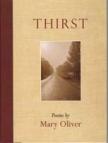God's Beautiful Lessons
To read Thirst, Mary Oliver’s most recent book of poems, is to feel gratitude for the simple fact of being alive. This is not surprising, as it is the effect her best work has produced in readers for the past 43 years. Admirers of any one of the 15 previous collections by the Pulitzer Prize-winning poet will be pleased to find poems that celebrate the beauty and sacredness of the natural world. In Messenger and When I Am Among the Trees, for instance, Oliver offers thanks and praise for creation and accords its creatures spiritual power that goes beyond the simple fact of their beauty: I would almost say that they save me, and daily.
Indeed, the poet’s regard for nature may seem to teeter occasionally on the brink of pantheism, yet attentiveness to the poems, especially within the context of this particular volume, soon dispels this misperception. Often the poet approaches God, uncharacteristically, through more conventionally religious means: through the language of prayer and meditation, through engagement of liturgical ritual and through participation in sacrament. The presence of these elements marks a movement away from the nonspecific spirituality implicit in Oliver’s previous work and toward a frank acknowledgment of faith that is decidedly Christian.
Thirst is elegiac in genre and in spirit. A number of the poems mourn the death of Oliver’s longtime companion and muse, Molly Malone Cook, who died in 2005. In the course of the collection, we witness the poet, who is ordinarily confident and hopeful in her disposition, struggle against doubt, grief and loneliness in her search for consolation. The short poem, The Uses of Sorrow, states elegantly the central theme of the volume: Someone I loved once gave me/ a box full of darkness./ It took me years to understand/ that this, too, was a gift.
The gifts the poet discovers as she endures this dark night of the soul are many, and chief among these is her faith. In a remarkable series of poems interspersed throughout the volume, she chronicles a process of awakening to God’s loving presence through the reading of Scripture (After Her Death), through attending church and partaking of the Eucharist (Coming to God: First Days, The Vast Ocean Begins Just Outside Our Church: The Eucharist) and through imaginative engagement of Christ’s words and events in his life (Six Recognitions of the Lord, The Poet Thinks About the Donkey and Gethsemane). In these latter two poems, Oliver explores spiritual and aesthetic terrain that is traditional and yet does so in a way that is characteristically her own.
The Poet Thinks About the Donkey takes the form of an Ignatian meditation: the composition of place is evident in the first lines: On the outskirts of Jerusalem/ the donkey waited. Then the speaker imagines the role played by this lowly creature in Christ’s triumphal entry into the cityhow he waits patiently, lets himself be led away, allows the stranger to mount and marvels at the loud crowds.
The conclusion, as well as the title, bears the stamp of Oliver’s imagination, her sensitivity to every aspect of the creation and her conviction that all of it (including the donkey) is holy: I hope, finally, he felt brave./ I hope, finally, he loved the man who rode so lightly upon him,/ as he lifted one dusty hoof and stepped, as he had to, forward. In Gethsemane, the companion poem to this one, the poet’s compassionate eye is directed toward the sleeping disciples who, unlike the grass, the lily and the cricketall present in the gardenare human, and, therefore, weak: Oh the dear bodies, slumped and eye-shut, that could not/ keep that vigil, how they must have wept,/ so utterly human, knowing this too/ must be a part of the story. Indeed, the disciples’ story is our own, the poet obliquely reminds us, as we resemble them more closely than we do the faithful donkey or the attentive stars. To be human is to desire God and to lack the perfection he possesses. Many of these poems, echoing the urgency of the volume’s title poem, articulate the speaker’s relentless longing, this thirst for the goodness I do not have.
The poet prepares the way for this extended exploration of her soul with a poem that occurs early in the collection, Making the House Ready for the Lord. In a gesture reminiscent of the Roman centurion’s declaration of faith and the prayer before Communion (Lord, I am not worthy to receive you), the speaker asks God’s pardon for the disorganized jumble that constitutes her mind and heart. She apologizes for the uproar of mice under the sink, for the squirrels that have gnawed their ragged entrances into her home and her poems. Yet in her acknowledgment of faith, still I believe you will/ come, Lord, and in her assurance to him that when I speak to the fox,/ the sparrow, the lost dog, the shivering sea-goose, know/ that really I am speaking to you, the poet asserts that it is through the humble agency of these creatures that she has come to know God. Thus, as she has said to them these many years, the door of her poems flung wide open, she says to the reader and to the Lord: Come in, come in. This fine poem, compelling in its lyric intensity and endearing in its honesty, serves as ars poetica, prayer of preparation, an open invitation that the lover of poetry and seeker of God would do well to accept.
This article also appeared in print, under the headline “God's Beautiful Lessons,” in the October 9, 2006, issue.









